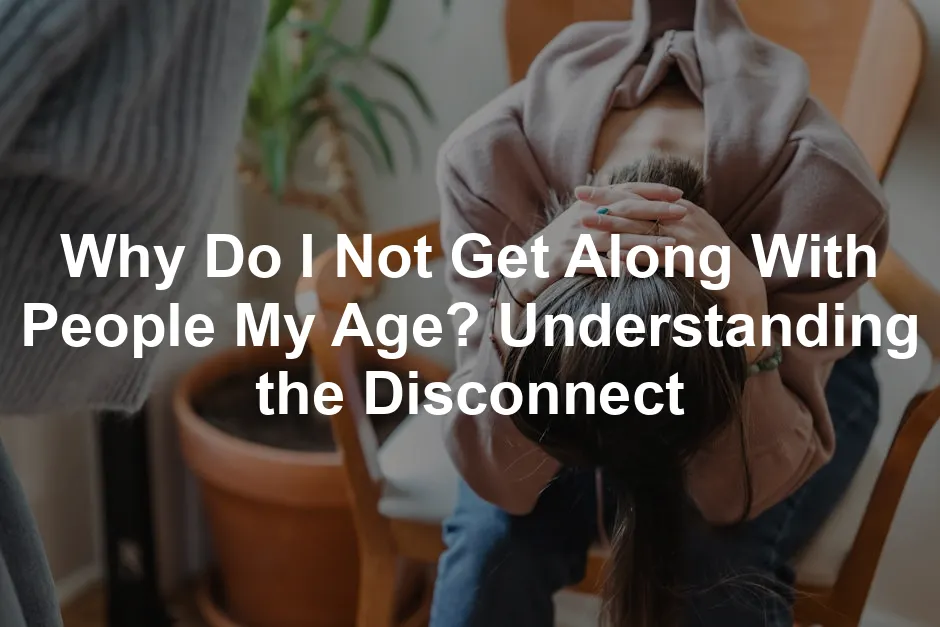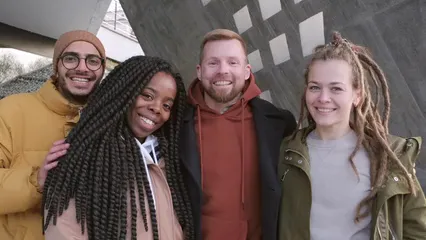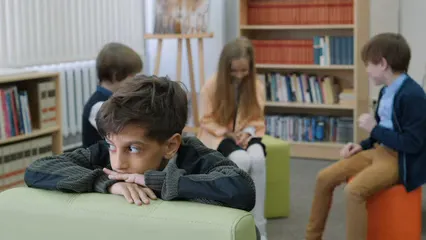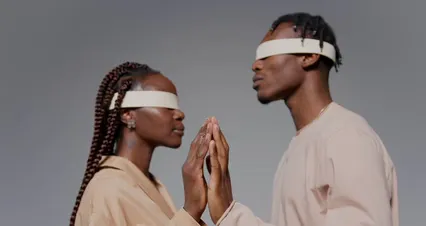
Why Do I Not Get Along With People My Age? Understanding the Disconnect
Introduction
In a world that seems to thrive on age-based stereotypes, feeling out of sync with peers can be both puzzling and isolating. Have you ever found yourself sitting in a room full of 20-somethings, feeling like you’re living in a different dimension? You’re not alone. Many individuals grapple with this phenomenon, often questioning their maturity, interests, and place in social circles.
Perhaps you’ve noticed a disconnect when friends chatter about dating apps or latest music trends, while you’d rather discuss the philosophical implications of time travel. It’s a common dilemma. Maybe you’ve always felt like a wise owl among a flock of carefree sparrows. This isn’t an indication of inferiority; it’s simply a reflection of how varied we all are.
Many individuals struggle to connect with their peers. This can lead to feelings of loneliness and confusion. It’s not just about age; it’s about personality, experiences, and preferences. In this article, we explore the reasons you may not get along with people your age. We’ll look at everything from personality differences to societal expectations. After all, understanding the ‘why’ can be the first step toward finding your tribe.
The journey to finding meaningful connections can be complex. But don’t fret! By unpacking these reasons, you can pave the way to friendships that feel right. Whether it’s learning to embrace your unique quirks or seeking out communities that resonate with you, there’s hope. Let’s kick-start this exploration and uncover the nuances of social interactions across age boundaries. You might just find that your age is merely a number, and genuine connections can flourish regardless of it.

Understanding the Disconnect
Personality Types and Social Dynamics
Have you ever been in a group where everyone seems to be vibing, but you feel like a fish out of water? It often boils down to personality types. Introverts, for instance, may find themselves overwhelmed when trying to connect with extroverted peers. Picture this: an introvert at a raucous party, watching the extroverted crowd dance and laugh. Meanwhile, they just want to enjoy a quiet cup of tea and discuss the latest episodes of their favorite show. It’s not that introverts don’t like people; they just prefer more intimate, one-on-one interactions.
Now, let’s sprinkle in some empathy and sensitivity. Highly sensitive people (HSPs) often feel emotions intensely. This can create a disconnect in social settings that don’t align with their emotional needs. Imagine being at a loud, crowded event when all you crave is a cozy nook to chat about deeper topics. The struggle is real! HSPs may find themselves drained after socializing, making them hesitant to engage in gatherings that don’t cater to their emotional landscape.
To illustrate this, consider Sarah’s story. She’s a sensitive soul who attended a college party filled with loud music and small talk. While her peers were busy bonding over the latest viral meme, Sarah felt lost in the noise. After a few awkward attempts at joining the conversation, she retreated to a quiet corner. It’s not that she didn’t want to connect; she simply needed a different environment to thrive.
Another example is Jake, an introverted guy who often finds himself surrounded by extroverted friends. At first, he tried to keep up, but the constant chatter left him feeling exhausted. He learned to embrace his introversion, seeking out quieter settings where he could engage meaningfully. His friends now appreciate that sometimes, a chill night in with a good movie is more enjoyable than a late-night party. Speaking of good movies, why not cozy up with a classic like A Beautiful Day in the Neighborhood DVD? Sometimes, a heartwarming film is just what you need to unwind.
Understanding these dynamics can help bridge the gap between differing personality types. By acknowledging that not everyone thrives in the same social environment, we can foster connections that honor our unique traits.

Life Experiences and Perspectives
Next up, let’s chat about life experiences and how they shape our perspectives. Growing up in diverse environments plays a significant role in how we interact socially. For instance, someone raised in a bustling city might have different social skills than someone from a small town. This disparity can lead to misunderstandings and feelings of disconnection.
Consider the words of Emily, a young woman who moved from a quiet rural town to a lively urban center. She often felt out of sync with her college peers, who were used to the fast-paced city life. “I was used to small gatherings, where conversation flowed naturally. Suddenly, I was in a sea of people who thrived on large parties and raucous debates,” she shared. Emily’s story highlights how our backgrounds inform our social preferences. If you’re looking for a great read to help you reflect on your own experiences, The Gifts of Imperfection by Brené Brown is a fantastic choice.
Moreover, anecdotal evidence from others echoes this sentiment. Tom, who was homeschooled, found it challenging to relate to peers who had traditional school experiences. “I felt like I was playing catch-up, trying to understand their inside jokes and references,” he reflected. His experience illustrates how unique backgrounds can create barriers in forming connections.
Embracing these differences is essential for fostering understanding. It’s vital to remember that everyone’s journey is unique, and acknowledging our diverse backgrounds can lead to more meaningful interactions.

Shared Interests and Values
Finally, let’s discuss the importance of shared interests and values in friendships. Finding common ground is often the key to building connections. When our hobbies align, friendships can blossom effortlessly. Think about it: who wouldn’t want to hang out with someone who shares their passion for indie films or loves hiking?
However, age-related interests can diverge significantly. A twenty-something might be deeply invested in the latest TikTok trends while a thirty-something prefers to binge-watch classic films. This divide can create a sense of isolation. If you’re looking for a timeless classic that never fails to impress, consider reading The Great Gatsby by F. Scott Fitzgerald—it’s a classic for a reason!
Take Lisa, for example. At twenty-five, she felt out of place among her peers who constantly discussed dating apps. “I just wanted to talk about my latest book obsession,” she admitted. Finding individuals who shared her literary passion proved challenging until she joined a local book club, where she connected with a diverse group of readers. If you’re also a book lover, you might want to check out The Subtle Art of Not Giving a F*ck by Mark Manson—a great read for a fresh perspective!
In conclusion, understanding the nuances of personality types, life experiences, and shared interests can help us navigate our social landscapes. By recognizing these factors, we can foster deeper connections and embrace the beauty of our differences. After all, finding our tribe is about more than just age; it’s about shared values and experiences that resonate with our authentic selves.

Cultural and Societal Expectations
Age Norms and Stereotypes
In today’s society, age norms can feel like a pair of ill-fitting shoes. They might look nice, but they’re just plain uncomfortable. Stereotypes about age groups often dictate how we should behave, think, and interact. For example, there’s an unspoken rule that people in their twenties should be wild, carefree, and constantly on the go. Meanwhile, those in their thirties are expected to be settling down, perhaps with a mortgage and a minivan. This pressure can create awkward social dynamics, making it hard for individuals to connect on a genuine level.
Imagine a twenty-something at a bar, surrounded by peers discussing their latest escapades. Meanwhile, they’re inwardly cringing, wishing they could chat about their latest book obsession or philosophical musings. That pressure to conform can lead to feelings of isolation, as authentic connections become overshadowed by societal expectations. If you find solace in literature, why not dive into The Catcher in the Rye by J.D. Salinger? It’s a classic that captures the essence of feeling out of place.
Breaking free from these stereotypes is essential. It involves embracing who you are and seeking out individuals who reflect your values and interests. You don’t have to fit into a mold; instead, you can create your own. For instance, joining niche clubs or attending events that cater to your interests can help you meet like-minded people. Whether it’s a book club, a cooking class, or even a board game night, finding spaces where you feel comfortable can make all the difference.

Understanding how cultural expectations influence our social interactions can help us navigate these pressures more effectively.
By challenging age-related norms, you open up a world of diverse connections. It’s perfectly fine to be a thirty-something who loves video games or a twenty-something who enjoys quiet nights in. Remember, it’s not about age; it’s about finding your tribe. If you’re a gamer, you might want to check out A Game of Thrones (A Song of Ice and Fire) by George R.R. Martin—it’s a fantastic read that blends fantasy with intricate character relationships!
The Evolution of Friendships
Friendships aren’t static; they evolve just like we do. As we transition through life stages, our social circles often shift dramatically. In your twenties, you might be surrounded by a carefree group of friends who thrive on spontaneity. Fast forward a few years, and suddenly, everyone’s getting married, starting families, or focusing on careers. Those late-night hangouts can quickly turn into brunches and playdates.
This evolution can create a sense of disconnect. You may find yourself reminiscing about the good old days while your friends are navigating new responsibilities. Major life events can change the fabric of friendships. For instance, when one friend gets married, it often alters the group dynamic. The late-night texts about weekend plans dwindle, replaced by discussions about diaper bags and school schedules.
However, this doesn’t mean friendships have to fade away. It’s all about adaptability. Embrace the changes and try to find common ground with your friends. Share your new experiences, and be open to theirs. You might be surprised at how much you can still relate, even if life looks different now. And if you’re looking for a way to bond over shared experiences, consider hosting a movie night with classics like The Shawshank Redemption DVD—a timeless tale of friendship and resilience!
Consider the story of Mark, who struggled to maintain friendships after getting married. Initially, his buddies would joke about his new life, but he took the initiative to include them. He organized game nights that combined their old interests with new ones. As a result, his friendships not only survived but thrived. They were no longer just hanging out; they were creating new memories together.
In conclusion, friendships evolve with life stages. Embrace those changes, adapt, and seek out connections that resonate with your current self. After all, it’s the beautiful tapestry of diverse experiences and shared moments that enrich our lives, regardless of age.

The Aging Process and Its Impact
Growing Out of the Disconnect
Feeling out of place with your peers can be disheartening. But guess what? That sense of disconnect often fades with age. Many people report that as they enter adulthood, the rigid boundaries of age begin to blur. Suddenly, you’re no longer confined to friendships designated by birth year. Social circles expand, and inclusivity becomes the norm.
Take the experience of the Pink Superhero. She felt out of sync with her peers in her teens and early twenties. Yet, as she transitioned into adulthood, she found herself surrounded by a diverse group of friends. “I don’t feel that way anymore. I can choose who I spend time with,” she shared. Sounds liberating, right? As life progresses, the pressure to fit neatly into age-based categories diminishes, allowing more authentic connections to flourish.
Additionally, many individuals experience a shift in values and interests over time. When you’re younger, societal expectations can feel overwhelming. Everyone seems to be racing toward the same milestones: parties, dating apps, and trends. As you age, the chase for societal approval often takes a back seat. Instead, you start prioritizing genuine relationships over superficial ones. This can lead to more fulfilling connections, regardless of age. If you’re looking to embrace mindfulness in your journey, The Power of Now by Eckhart Tolle is a great resource.

Real-life Examples
Real-life testimonials abound, showcasing how social dynamics evolve with age. For instance, a user from Ask Metafilter shared that she felt isolated in her teenage years. “I thought things might change as I entered adulthood, and they did,” she noted. By her mid-twenties, she found herself in a diverse group of friends who shared her interests and values, regardless of their ages.
Similarly, a participant on a forum recounted how her social life transformed after college. “I used to feel out of place. Now, I hang out with people of all ages. We bond over shared interests, not age,” she explained. Many people report that once they leave the structured environment of school, they feel freer to form connections based on mutual interests rather than societal pressures.
Even those who once felt the disconnect often find that the older they get, the more diverse their friendships become. These transformations highlight that age is just a number when it comes to meaningful relationships.

Embracing Diversity
Seeking friendships across age groups can be a game-changer. Not only does it enrich your social life, but it also broadens your perspective. Different generations bring unique experiences, ideas, and insights to the table. Imagine the wisdom you could gain from someone who has navigated life’s ups and downs before you!
Engaging with individuals from various age groups can create a vibrant tapestry of relationships. Whether it’s learning from someone older or sharing youthful exuberance with someone younger, these friendships can significantly enhance your life. So, don’t shy away from connecting with individuals outside your age bracket. If you’re looking for inspiration, you might enjoy The Tao of Pooh by Benjamin Hoff—it’s a delightful read that blends philosophy and humor!
Join community groups, volunteer, or participate in classes that attract a diverse crowd. You might just discover that some of your most rewarding friendships lie in unexpected places. Embrace the opportunity to learn from others, and remember: the best connections are often found where you least expect them.
In conclusion, as you navigate the aging process, keep an open mind about friendships. The disconnect you feel now may very well transform into a rich network of diverse relationships over time. Age has little bearing on the depth and quality of human connections, so go ahead—reach out and broaden your horizons!

FAQs
Is it normal to feel disconnected from people my age?
Absolutely! Many individuals experience this at various life stages.
How can I find friends outside my age group?
Engage in community activities, online forums, or interest-based groups that attract diverse age ranges.
What if I feel lonely because of this disconnect?
Consider speaking to a counselor or therapist who can help you navigate these feelings.
Can my interests change as I age?
Definitely! Interests often evolve, leading to new friendships.
Is it okay to prefer friends who are older or younger?
Yes! What truly matters is mutual respect and shared interests, regardless of age.
Conclusion
Feeling disconnected from your peers doesn’t mean you’re alone or less mature. It can be a signal that you’re ready to seek out deeper, more meaningful connections. You might find that you resonate more with individuals who share your interests and values. So don’t despair if your social circle feels like a puzzle with missing pieces.
As you journey through life, keep in mind that friendships can flourish at any age. The right connections are out there, waiting for you. It’s all about finding those who appreciate your quirks and embrace your unique perspective. Friends who understand you can make life’s ups and downs feel like a breeze.
Remember, it’s perfectly okay to bond with people older or younger than you. Age is merely a number! What truly matters is the shared laughter over a cup of coffee or a deep conversation that lasts for hours. So, whether you find camaraderie among fellow bookworms in a club or enjoy the company of younger friends who share your love for video games, cherish those connections. If you’re looking to unwind with a good read, you can’t go wrong with The Hobbit by J.R.R. Tolkien—an enchanting adventure!
In the end, your social landscape may look different than you imagined. But that’s what makes it exciting! Embrace the diversity of friendships that come your way. They can enrich your life in ways you never thought possible. Your tribe is out there, ready to welcome you with open arms. Keep looking, and you’ll discover friendships that feel just right.
Please let us know what you think about our content by leaving a comment down below!
Thank you for reading till here 🙂
All images from Pexels




